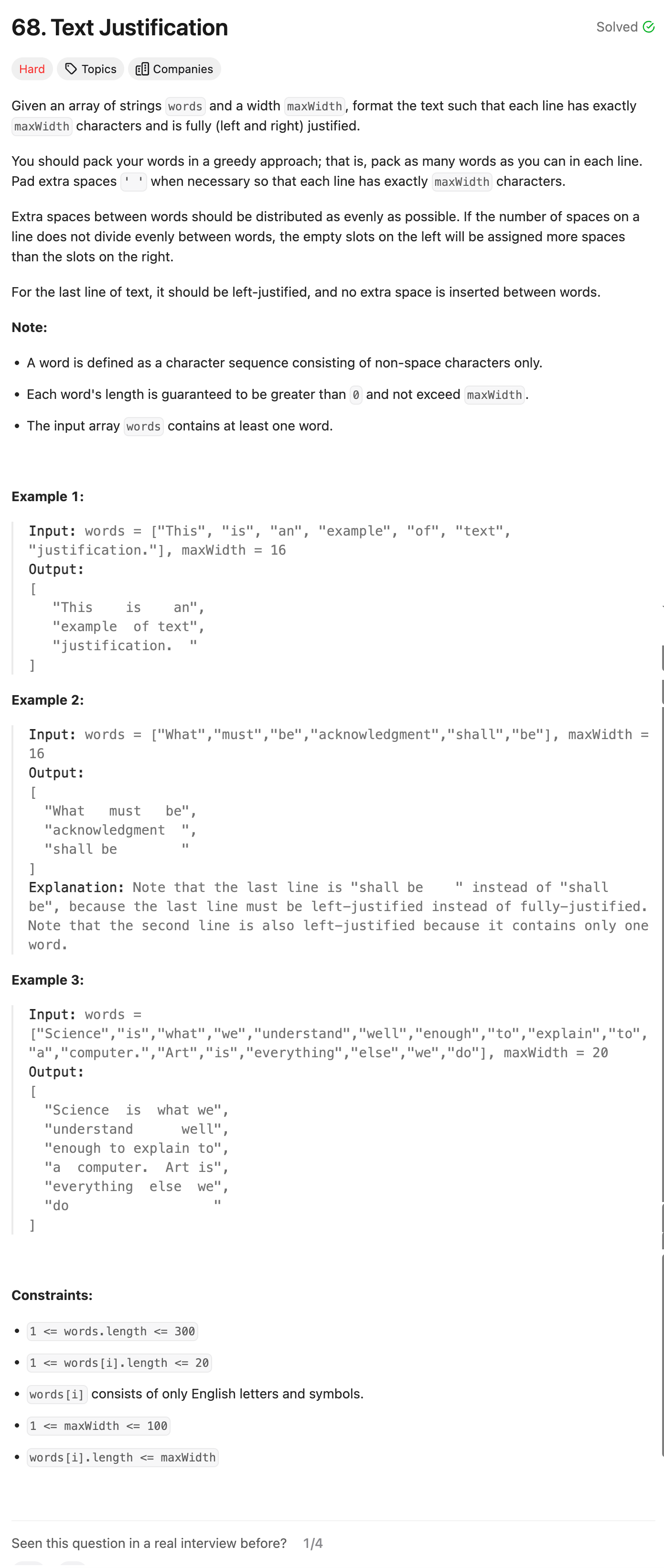Problem of The Day: Text Justification
Problem Statement
Intuition
The idea is to simulate the process of justifying text by greedily packing as many words as possible into one line. While adding words to a line, a whitespace is also added between words. Special attention is given to handling available spaces and addressing edge cases where additional whitespace may not be needed.
Approach
I first created a hash_map to store the length of each word for quick access. Then, I iterated through the words to form lines. For each word, I checked if adding it to the current line would exceed the maximum width. If it didn’t, I added the word to the current line and adjusted the available spaces. If adding the word would exceed the width, I started a new line.
After forming the lines, I went through each line and distributed the spaces between words to justify the line. I calculated the number of spaces needed and distributed them evenly. If there were remaining spaces, I added them to the leftmost words.
Complexity
-
Time complexity: O(n), where n is the total number of characters in the words list.
-
Space complexity: O(n), as I used a hash_map to store the lengths of the words and created lists to store the lines and final result.
Code
class Solution:
def fullJustify(self, words: List[str], maxWidth: int) -> List[str]:
hash_map = defaultdict(int)
for word in words:
hash_map[word] = len(word)
res = []
curr = []
available_spaces = maxWidth
for word in words:
if available_spaces - hash_map[word] == 0:
available_spaces -= hash_map[word]
else:
available_spaces -= (hash_map[word] + 1)
if available_spaces >= 0:
curr.append(word)
else:
if curr:
res.append(curr[:])
available_spaces = maxWidth
available_spaces -= (hash_map[word] + 1)
curr = [word]
if curr:
res.append(curr[:])
for i in range(len(res) - 1):
arr = res[i]
num_of_chars = 0
num_of_words = len(arr)
for s in arr:
num_of_chars += hash_map[s]
spaces = maxWidth - num_of_chars
spaces_in_between = spaces // (num_of_words - 1) if num_of_words > 1 else 0
spaces_left = spaces % (num_of_words - 1) if num_of_words > 1 else 0
for j in range(spaces_left):
arr[j] = ''.join(list(arr[j]) + [' '])
if spaces_in_between > 0:
delimiter = ' ' * spaces_in_between
res[i] = str(delimiter.join(arr))
else:
res[i] = str(''.join(arr))
if len(res[i]) < maxWidth:
res[i] += ' ' * (maxWidth - len(res[i]))
if res:
res[-1] = str(' '.join(res[-1]))
if len(res[-1]) < maxWidth:
res[-1] += ' ' * (maxWidth - len(res[-1]))
return res
Editorial Solution - clean code
class Solution:
def fullJustify(self, words: List[str], maxWidth: int) -> List[str]:
def get_words(i):
current_line = []
curr_length = 0
while i < len(words) and curr_length + len(words[i]) <= maxWidth:
current_line.append(words[i])
curr_length += len(words[i]) + 1
i += 1
return current_line
def create_line(line, i):
base_length = -1
for word in line:
base_length += len(word) + 1
extra_spaces = maxWidth - base_length
if len(line) == 1 or i == len(words):
return " ".join(line) + " " * extra_spaces
word_count = len(line) - 1
spaces_per_word = extra_spaces // word_count
needs_extra_space = extra_spaces % word_count
for j in range(needs_extra_space):
line[j] += " "
for j in range(word_count):
line[j] += " " * spaces_per_word
return " ".join(line)
ans = []
i = 0
while i < len(words):
current_line = get_words(i)
i += len(current_line)
ans.append(create_line(current_line, i))
return ans
- Time complexity: O(n * k) where n is length of
wordsand k is the average length of aword - Space complexity: O(m) where m is the
maxWidth
